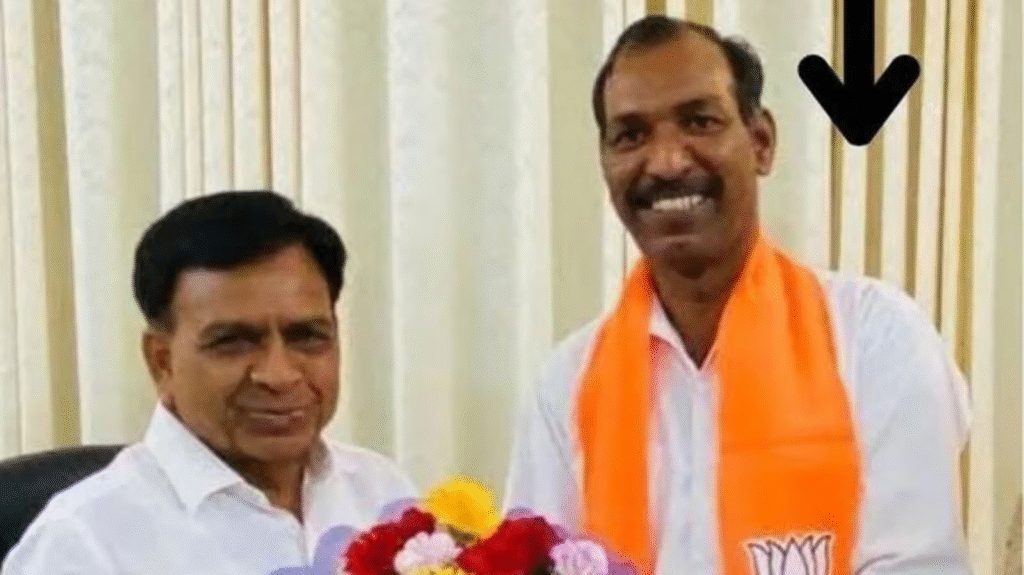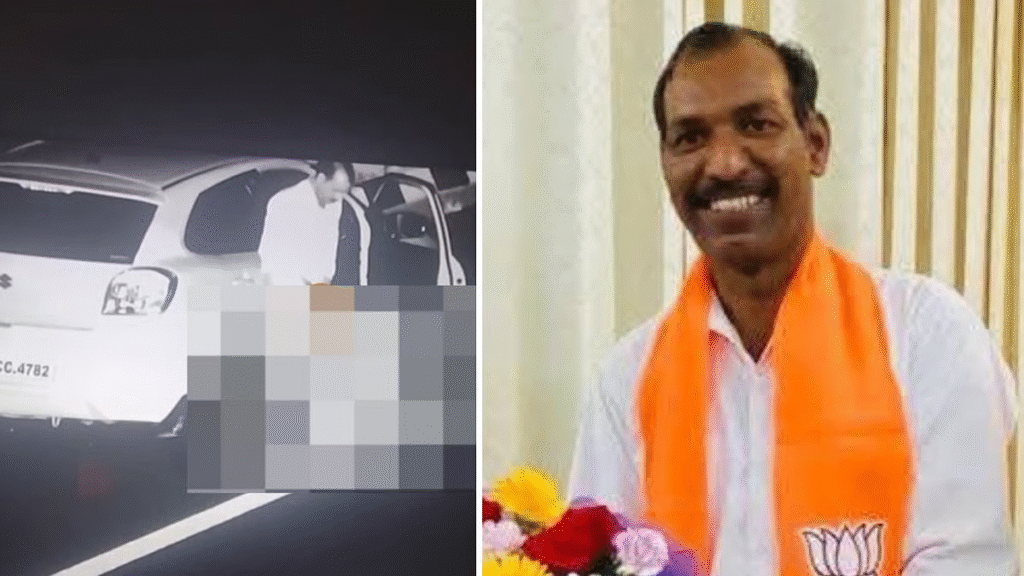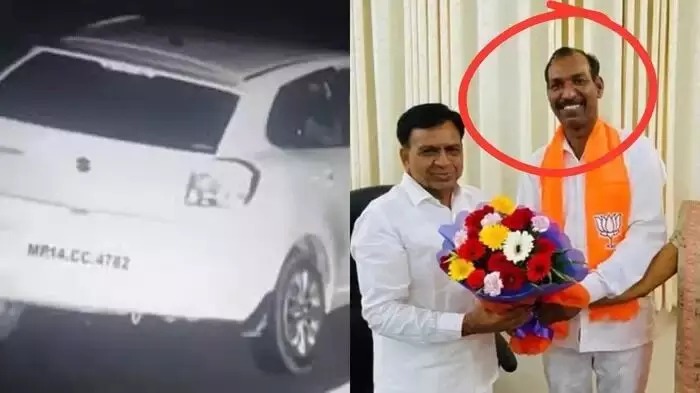
Outrage in Mandsaur: BJP Leader Manohar Dhakad Detained Following Viral Video Controversy
In a deeply unsettling incident that has rocked the political and social fabric of Mandsaur, Madhya Pradesh, BJP leader Manohar Dhakad was recently arrested and taken into police custody after an obscene video featuring him went viral on social media. The video reportedly captured Dhakad engaging in inappropriate and offensive behavior on a highway, leading to widespread condemnation from residents, political leaders, and civil society alike.
The emergence of the video has triggered an intense public uproar, putting the local law enforcement agencies under pressure to respond swiftly and decisively. Recognizing the seriousness of the situation and the need to uphold the law without bias, the police promptly arrested Dhakad, initiating a thorough investigation to ascertain the facts and hold those responsible accountable.
This development has not only sparked heated debates within Mandsaur’s political corridors but has also spotlighted the broader challenges of political accountability and the ethical standards expected of public figures in contemporary India.
The Incident: Viral Video and Immediate Public Reaction
The disturbing video, which surfaced on various social media platforms including WhatsApp, Facebook, and Twitter, showed BJP leader Manohar Dhakad in a compromising position, engaging in conduct widely regarded as vulgar and unbecoming of an elected representative. The clip, though brief, was enough to ignite a wave of outrage across the district.
Residents expressed shock and dismay that a figure entrusted with public responsibility would behave in such a manner in a public space. The incident quickly dominated conversations in local communities, market places, and on digital forums, with citizens demanding urgent action against Dhakad.
Social media users were particularly vocal, condemning the act and calling for the immediate resignation of the BJP leader. Hashtags demanding justice and transparency trended in regional languages, reflecting the depth of anger among the populace.
In response to the public outcry, the Mandsaur police verified the authenticity of the video through preliminary investigations before moving to detain Dhakad. Officials emphasized that the law applies equally to everyone, irrespective of their political status, underscoring the commitment to impartiality.
Political Fallout: How the Scandal Affects BJP’s Image in Mandsaur
Mandsaur has long been considered a BJP stronghold, with the party wielding significant influence over local governance and political decision-making. However, this scandal has cast a shadow over the party’s reputation in the district.
Political analysts point out that such controversies could potentially damage BJP’s standing, particularly ahead of forthcoming elections where public trust and image play a pivotal role. The perception of moral failings among leadership can alienate core supporters and provide ammunition to rival parties seeking to capitalize on the BJP’s vulnerabilities.
Opposition parties in Madhya Pradesh, including the Congress and regional outfits, have seized the opportunity to criticize the BJP’s alleged double standards and failure to enforce discipline within its ranks. They argue that the party must take strict action not only to protect its image but to uphold the values it claims to represent.
Within the BJP, there are reports of internal discussions focusing on damage control and strategies to mitigate political fallout. Party leadership faces the challenge of addressing public sentiment without prematurely prejudging the outcome of the ongoing investigation.
The Role of Social Media in Amplifying the Incident
The incident involving Manohar Dhakad underscores the transformative role social media plays in Indian politics today. Unlike previous decades, when such matters might have been confined to local rumor mills or traditional news cycles, platforms like WhatsApp and Twitter have accelerated the spread of information and public mobilization.
The rapid viral dissemination of the video compelled law enforcement and political actors to act quickly, reflecting how digital platforms can serve as watchdogs for public accountability. However, the episode also brings attention to the ethical dilemmas posed by viral content — the balance between exposing wrongdoing and preserving dignity and privacy.
Experts caution that viral videos can sometimes be manipulated or taken out of context, potentially leading to misinformation or character assassination. Therefore, while social media acts as a powerful tool for transparency, it also necessitates careful handling and verification by authorities and users alike.
In Mandsaur, the viral video ignited a digital storm that spilled over into physical protests and political discourse, illustrating the seamless integration of online and offline activism in contemporary India.
Legal Dimensions: Charges and Investigation Procedures
Following his arrest, Manohar Dhakad is now subject to a formal legal process. Authorities have indicated that he may face charges related to public obscenity, disorderly conduct, and violation of laws designed to maintain public decency.
The police investigation is extensive and multi-faceted. Beyond confirming the authenticity of the video, officials are probing into the circumstances under which the footage was recorded, identifying any individuals involved in recording or disseminating the clip, and examining whether any laws related to privacy or cybercrime have been breached.
Legal experts highlight that such cases are complex, as they involve balancing the right to privacy with public interest and the enforcement of morality laws. The courts will also need to ensure that Dhakad’s rights to a fair trial are protected, avoiding undue prejudice from media coverage.
If found guilty, the consequences for Dhakad could be severe, ranging from fines and imprisonment to disqualification from holding public office, depending on the specifics of the case and applicable statutes.
Political Ethics and Public Expectations in Contemporary India
The scandal involving Manohar Dhakad is symptomatic of broader challenges confronting Indian democracy regarding political ethics and leadership accountability. Voters increasingly expect their representatives to embody not just administrative competence but also personal integrity and moral uprightness.
In recent years, a string of high-profile controversies involving politicians from various parties has fueled public skepticism and demands for stricter ethical codes. Citizens and civil society organizations advocate for mechanisms that prevent misconduct and ensure swift punitive measures when standards are breached.

This incident serves as a potent reminder that elected leaders carry the burden of public trust and that their actions, both public and private, are subject to scrutiny. The erosion of ethical standards can weaken democratic institutions and diminish citizens’ faith in governance.
The Human Impact: Families, Communities, and Social Repercussions
Beyond politics and law, the incident has profound human consequences. The viral nature of the video means that Dhakad’s family, friends, and community members also face social stigma and emotional distress.
In smaller towns and close-knit communities like Mandsaur, such controversies often disrupt social harmony and can lead to ostracization. Family members may endure harassment or public shame, complicating personal relationships and community standing.
Psychologists emphasize the importance of sensitive handling of such cases, advocating for support systems to help affected families cope with the fallout. At the same time, there is a call for responsible media coverage that respects privacy and avoids sensationalism.
Governance Challenges: Maintaining Law and Order Amid Political Controversy
The arrest of a sitting political leader brings with it significant governance challenges. Authorities must ensure that the investigation proceeds without interference or intimidation, maintaining the rule of law.
Law enforcement agencies are under scrutiny to demonstrate fairness and efficiency, balancing the need for transparency with the confidentiality required for a successful probe. They also face the task of managing public order, especially if protests or counter-protests emerge.
For local administration in Mandsaur, the incident is a test of institutional resilience and the ability to uphold democratic norms in politically charged environments.
Historical Context: Political Scandals and Their Impact on Indian Politics
India’s political history is replete with scandals that have shaped public perceptions and electoral outcomes. From corruption allegations to moral turpitude, such incidents have periodically rocked parties and politicians alike.
The Manohar Dhakad case fits into this continuum, reflecting ongoing tensions between public expectations and political realities. Historically, scandals have sometimes led to the downfall of political careers, party realignments, and reforms aimed at enhancing transparency.
Analyzing past cases offers valuable insights into how this current situation might evolve, emphasizing the importance of robust institutional responses and civic engagement.
The Road Ahead: What This Means for Mandsaur and Madhya Pradesh Politics
As the investigation continues, the future trajectory of this case will have significant implications. For Manohar Dhakad, the outcome could define his political legacy, either as a cautionary tale or as a figure vindicated by due process.
For the BJP in Madhya Pradesh, managing the fallout will require strategic communication, internal reforms, and possibly candidate re-evaluation ahead of elections. The party’s handling of this crisis may influence voter confidence and its broader standing in the state.
More broadly, this incident could catalyze discussions about political accountability, the use of social media in governance, and the ethical responsibilities of elected officials.
Reflections on Media Responsibility and Citizen Engagement
The role of media—both traditional news outlets and social media platforms—in shaping the narrative around such incidents is crucial. Journalists and content creators bear the responsibility of reporting with accuracy, fairness, and sensitivity.
Citizens, empowered by digital tools, also play a role in verifying information, engaging in constructive dialogue, and demanding accountability from leaders without resorting to misinformation or character attacks.
This evolving dynamic marks a shift towards a more participatory and transparent democracy but also calls for greater media literacy and ethical standards among users.
Conclusion: Upholding Justice and Restoring Public Trust
The arrest of BJP leader Manohar Dhakad in connection with a viral obscene video has shaken the foundations of political trust in Mandsaur. It highlights the urgent need for ethical leadership, rigorous law enforcement, and vigilant citizenry.
As the case unfolds, it presents an opportunity for all stakeholders—politicians, law enforcement, media, and citizens—to reaffirm their commitment to justice and democratic values. The manner in which this crisis is handled will resonate far beyond Mandsaur, influencing political culture across India.
Ultimately, restoring public trust requires transparency, accountability, and a shared dedication to integrity in public life.

